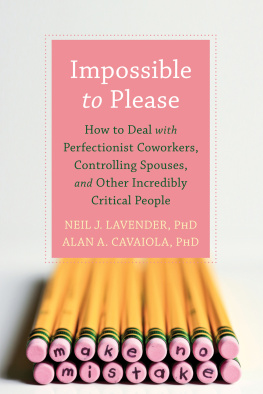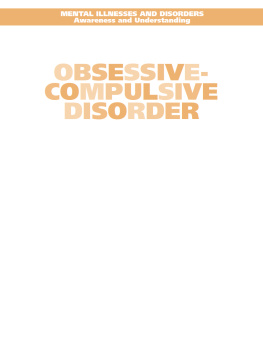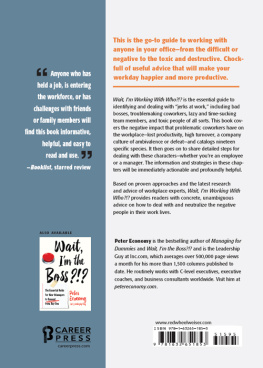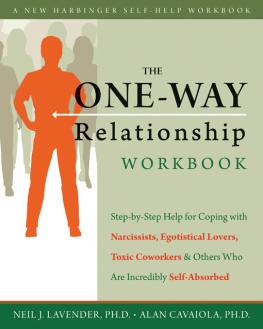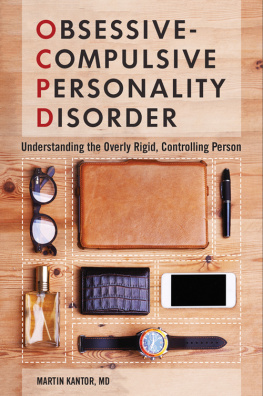
Neil J. Lavender, PhD, is professor of psychology at Ocean County College in New Jersey where he also maintains a private practice. He is coauthor of Toxic Coworkers and Impossible to Please. Neil, who is also an avid blogger, resides in Beachwood, NJ.
Alan A. Cavaiola, PhD, is a professor and member of the graduate faculty in the department of psychological counseling at Monmouth University. He is also a licensed psychologist and clinical alcohol and drug counselor.
Cavaiola and Lavender have done it again! They have given us another perfect combination of psychological science and real-life applications to provide a highly readable guide to living and working with people who drive us crazy. Alive with examples and suggestions, this book is not only perfect for counselors and therapists, but also for anyone who deals with controlling perfectionists at home or on the job.
Richard Ponton, PhD, associate professor at Georgian Court University in Lakewood, New Jersey
Impossible to Please is a candid, informative, and thought-provoking study of the controlling perfectionist. Lavender and Cavaiola illuminate our understanding of obsessive-compulsive personality disorder while providing suggested actions for dealing effectively with these individuals at home, at work, and in the community.
Suzanne D. Mudge, PhD, associate professor and program coordinator of counseling and guidance at Texas A&M University
After being in managerial and leadership positions for over 40 years, I wish I could say that I never had to deal with a perfectionist personality. Unfortunately, that is not the case. I have had experiences with toxic coworkers and, to say the least, they were indeed troublesome. Drs. Lavender and Cavaiolas first book, Toxic Coworkers, was of great help during these trying times. Like their other books, Impossible to Please is filled with wisdom and insights into this challenging area. I strongly recommend this most practical and applicable book.
Louis A. Scheidt, PE, PP, president and CEO of Innovative Engineering, Inc.

Publishers Note
This publication is designed to provide accurate and authoritative information in regard to the subject matter covered. It is sold with the understanding that the publisher is not engaged in rendering psychological, financial, legal, or other professional services. If expert assistance or counseling is needed, the services of a competent professional should be sought.
Distributed in Canada by Raincoast Books
Copyright 2012 by Neil J. Lavender & Alan Cavaiola
New Harbinger Publications, Inc.
5674 Shattuck Avenue
Oakland, CA 94609
www.newharbinger.com
All Rights Reserved
Acquired by Jess OBrien; Cover design by Amy Shoup; Edited by Will DeRooy; Text design by Michele Kermes
Library of Congress Cataloging-in-Publication Data
Lavender, Neil J.
Impossible to please : how to deal with perfectionist coworkers, controlling spouses, and other incredibly critical people / Neil J. Lavender and Alan Cavaiola.
p. cm.
Includes bibliographical references.
ISBN 978-1-60882-348-2 (pbk. : alk. paper) -- ISBN 978-1-60882-349-9 (pdf e-book) -- ISBN 978-1-60882-350-5 (epub)
1. Criticism, Personal. 2. Perfectionism (Personality trait) 3. Interpersonal conflict. 4. Interpersonal relations. I. Cavaiola, Alan A. II. Title.
BF637.C74L38 2012
158.2--dc23
2012021943
Contents
Acknowledgments
First, we acknowledge and give thanks to our families for putting up with us while we wrote this book. Youve always given us the space and encouragement we need to take on such tasks as research and writing.
We also thank our patients and our students. Youre by far some of the finest people weve ever met. We applaud your courage and motivation and your hunger for the truth and personal growth. Youve achieved so much while overcoming so many obstacles. Were so fortunate to be working in the field that we love, and youre such a big part of this. You challenge us every day to know and do more. Hopefully, in our teaching and therapy, weve been able to challenge you to overcome difficult hurdles in your lives, thereby enriching your lives in some way.
Our thanks wouldnt be complete without acknowledging the plentiful support we received from all the staff at New Harbinger. This is our third book with you, and youve never failed in your professionalism and guidance. Special thanks to acquisitions editor Jess OBrien. Thanks also to editorial manager Jess Beebe and associate editor Nicola Skidmore for taking us through this process step by step. Dr. Matt McKay and Angela Autry Gorden, whose recommendations helped shape the direction of this book: we couldnt have done this without your wisdom and expertise. To Will DeRooy of Intelligent Editing, a special shout out for the final editsyour suggestions were right on the mark.
Introduction
You picked up this book most likely because youre struggling in a relationship in which you feel the other person perceives you as not good enough. Perhaps this person is your spouse, or perhaps its your parent, a coworker, or your boss. In any event, this person seems to habitually criticize you. What you do never seems good enough for this personin everything you undertake, you constantly fall short of some perfect standard. If youre like most of the people with this problem weve encountered over the years, you experience numerous and often conflicting emotions in this relationship. You might feel sad or angry or even inadequate. Most likely you feel confused. You may have tried all you can to make this person happy, only to fail again and again.
Marianne was a grade school teacher who for eleven years received excellent evaluations from all of her supervisors. She got along well with her fellow teachers and staff and was twice voted teacher of the year. Parents often approached Marianne after the school year was over, thanking her personally for their students progress.
But when Mariannes principal was replaced by a woman who promised a more hands-on approach, it seemed that Marianne could do nothing right. Although she followed the new principals every recommendation, she received a poor performance evaluation, and when she tried to defend herself and provide explanations in response, the principal only dug her heels in deeper and accused her of insubordination. Letters and e-mails flew back and forth until one day the principal presented Marianne with a notice of termination containing many rather vague reasons, the most puzzling of which was a poor attitude.
Marianne was stunned. How could this have happened? she thought. I did everything right. Im a great teacher. How is it I could never be good enough for her?
Francine met Marco while she was still in high school. She always told her girlfriends, I fell in love with him because hes the best at everything. He was a straight A student, the star of his basketball team, and the president of the student council. He was well mannered, hard working, and respectful of all in authority.
But soon after Francine and Marco were married, he became emotionally distant, more involved with his work than he was with her and, eventually, the children. Whenever she became romantic, he claimed she was being childish. When she asked him to contribute to the household expenses, hed reply that he couldnt because shed just spend it frivolously. But worst of all, he subjected her to a barrage of constant criticism: he didnt like her friends, her family get-togethers (Theyre all just a sideshow of scatterbrained chatter), her laugh, her lovemaking, her housekeeping, her grammar. He even criticized her for the way she put the magazines in the magazine rack, claiming that the covers should be all be facing out and that she should know that was the only way magazines should ever be put away. He lectured her constantly on how she needed to make changes in her life.

